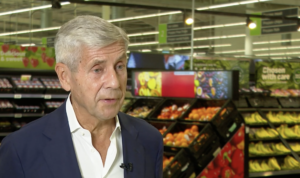Asda has experienced a notable decline in its grocery market share, just days after its chairman, Lord Rose of Monewden, publicly expressed his dissatisfaction with the supermarket’s performance.
According to recent data from Kantar, Asda’s sales fell by 6% in the 12 weeks leading up to 4 August, reducing its market share from 13.7% to 12.6%.
This downturn comes at a challenging time for the private equity-backed supermarket group, which has been losing ground to its major competitors, including Tesco, Sainsbury’s, and Morrisons. Lord Rose did not hide his disappointment, telling The Telegraph, “I’ve been in this industry for a long time and I am slightly embarrassed. I won’t deny that. I don’t like being second, third or fourth.”
Asda is majority-owned by TDR Capital, holding 67.5% of the company, while Mohsin Issa retains a 22.5% stake. His brother, Zuber Issa, sold his share to TDR earlier this year. In light of the recent challenges, Lord Rose has urged Mohsin Issa to step back from the day-to-day management of the chain, suggesting that the business now requires a different type of leadership. “He is a disrupter, an entrepreneur, he is an agitator,” Lord Rose said, acknowledging the significant changes under Issa’s leadership but implying that a new approach is necessary for the current market conditions.
In contrast, Tesco has continued to strengthen its position, with its market share rising from 27% to 27.6% in the same period. The supermarket has implemented an Aldi price-match scheme to retain customers amid the ongoing cost of living crisis, contributing to its steady growth in market share since August last year. Lidl has also gained ground, increasing its market share from 7.7% to 8.1%, while Aldi’s share slightly dipped from 10.2% to 10%.
Morrisons, despite a 1.4% increase in sales, saw its market share drop marginally from 8.7% to 8.6%, whereas Sainsbury’s sales growth of 5.2% boosted its market share from 14.8% to 15.3%.
This period of flux in the grocery sector highlights the pressures facing Asda as it navigates a competitive and changing market landscape, with leadership decisions likely to play a crucial role in its future trajectory.

























